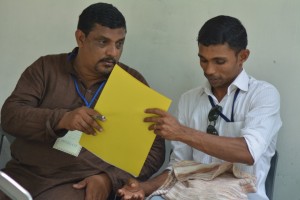– Odette Spruyt
I hope you will let me tell you a story about Lakshadweep, a group of islands in the Arabian sea, off the coast of Kerala, India.
A teacher of art at a government girls’ college in Kavaratti, one of the 10 inhabited islands of Lakshadweep, leads a grassroots palliative care project, Thanal. Starting alone, he responded to what he saw and felt was lacking in his island, home care relief for the people. On his bike, with a bag containing a meagre assortment of medical items and a heart full of compassion, he rode from home to home, caring for the ill and their families in whatever way he could. His first patient was an elderly man, abandoned by his family, soaked in excrement and dirt, lying alone in his home. From this beginning, one man dedicated to making a difference, one man without government or medical support, has been able to create a thriving palliative care program, extending across 5 of the 10 islands, primarily volunteer-based, which is now supported by health officials, government officials and other community leaders. His reputation is large, as is his heart and the hearts of the many volunteers he has inspired and offered a means of engagement in building a proud and self-sustaining community of action. There is next to no security, financial, staffing, nor external supports. It is a labour of love, a family more than a society where each member is able to contribute from their skills and learn new skills. It is a social movement, also promoting organic farming, cleaning up the island, exercise and diet, positive leadership and being responsible for your neighbours, literally. Sounds too good to be true, and yet, it is happening, 3 years in the making, big dreams, daily action.
When such roots take hold, let’s provide all the support and guidance and encouragement we can to help this tree to grow.
There is so much for us to learn from Lakshadweep.
We are reminded, strongly reminded, that providing palliative care is within the province of all of us. Anyone who has eyes to see and courage to act, can make a difference. Moulana started his work without a label. He then found out about Pallium India, an NGO working in Kerala, the state closest to Lakshadweep. He then found a name, palliative care, for what he was already doing. A doctor, Dr Ali Azher, and a nurse, Mr Ahammed Khafi , saw what he was doing and joined him. They attended the PI 6 week training and are now fully involved in palliative care service delivery and training of volunteers, working as volunteers after their normal workday is over. They provide 24 hour on call cover and frequently respond to requests for help. There are many others, such as Rafiq who provides accounting and administrative expertise as well as direct care, Sayed Koya assists with programs and functions with his organisational skills and energy and Mansoor, another nurse, is always ready to lend a hand.
We are reminded that it is in the home where most of the care takes place. Those of us who are privileged to work in higher income countries know only too well the loss of capacity of our communities to care. Not so in Lakshadweep, where patients are cared for at home, definitely as a duty within the framework of this island with a population who are entirely Muslim, but also as a loving service.
We are reminded that palliative care is a philosophy of care that extends beyond walls, beyond diagnoses, beyond professional labels and hierarchies, beyond medicines, equipment, services, beyond ourselves. Yes, many of the home care patients visited are bedridden living with chronic illness, subarachnoid or CVA- induced hemiplegia, bronchiectasis, encephalopathy with spasticity. But in a setting without home care services of any type, this is the need. The team dress pressure ulcers, check blood pressures, urinary catheters, Ryles’s tubes, tracheostomy tubes, contractures , hygiene and diet. They encourage and support the carers, mostly women, who are providing most of the hands-on care. Their visits reduce the loneliness of patients and carers alike.
Through Hamrahi, Australian palliative care professionals will continue to visit and support the development of services across the 10 islands of Lakshadweep, remote island communities which are being linked by the service of more than 75 volunteers, coordinated and motivated by the vision of one man who began this gigantic work on a simple bike.
Moulana and a volunteer

